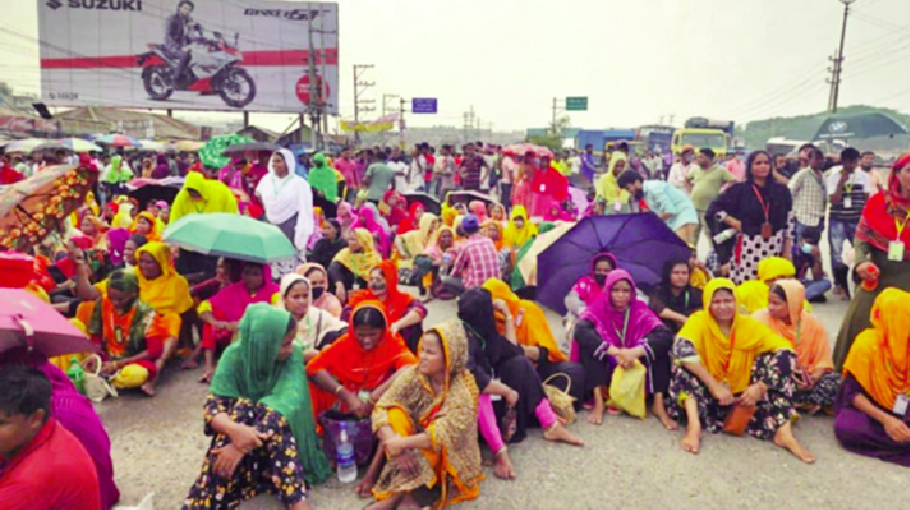RMG unrest continues
Many factories still shut

Despite multi-phased measures taken by the government and its different agencies to bring normalcy in the country's garments sector, the actual situation in the apparel sector is something else.
There are many RMG factories are still shut and protests by the workers of different factories still continued till Monday.
As part of the continuous protest, workers of a closed garment factory in the Ashulia industrial area staged protests on Monday, blocking the Nabinagar-Chandra Highway demanding three months' unpaid wages and the reopening of their factory.
Local sources and police said, the protest, involving hundreds of employees from Generation Next factory, began around 8:00am at the Baipail intersection. The protest continued almost daylong, causing severe traffic congestion on both the Nabinagar-Chandra and Baipail-Abdullahpur highways. According to the workers, the factory authorities abruptly shut down the factory, leaving them with three months of unpaid wages, while staff members are owed four months' salaries.
Despite the presence of officials of the Bangladesh Garment Manufacturers and Exporters Association (BGMEA) and police officials during previous discussions, the factory management has repeatedly failed to meet payment deadlines or take any steps towards reopening, they added.
The workers said they would not leave until their demands are met.
Md Sarwar Alam, superintendent of Ashulia Industrial Police 1, said, "The factory declared a general holiday a few weeks ago without settling the workers' dues. We've held several discussions with the factory owners and BGMEA to resolve the issue, but the workers took to the streets today because their salaries remain unpaid.
"Efforts are underway to clear the road and resolve the matter with the factory authorities," he said.
It should be mentioned that a volatile situation has been prevailing in the RMG sector since around last two months as the workers continued protests and demonstrations over their unpaid salaries and various other demands.
The BGMEA officials claimed that the sector has to incur loss of around 400 million US dollars due to the unrest.
State-run news agency BSS, however, reports; complete normalcy has returned to the country's garments sector as almost all factories are open now.
All factories are open in Narayanganj, Gazipur and Dhaka Metropolitan area, according to a garment sector situation update released by the chief adviser's press wing.
Minor crisis was reported in 3 factories at Savar-Ashulia, Narayanganj and Gazipur.
Currently, only one factory, as per rule 13/1, out of 401 is closed throughout Savar-Ashulia area, the situation update said.
Besides, The Telegraph reports: The political turmoil in Bangladesh appears to have benefitted India as readymade garments exports in September have increased 17.3 per cent from a year ago.
The growth comes at a time other apparel-exporting countries have experienced a slowdown.
Despite global headwinds, including inflation and supply chain disruptions, India’s exports have benefitted from Bangladesh’s political instability.
“India’s readymade garment (RMG) exports have recorded high growth despite global headwinds and continued inflationary pressure,” said Sudhir Sekhri, chairman of the Apparel Export Promotion Council (AEPC). “Even the major apparel-exporting countries have witnessed a slowdown in the RMG export growth in recent months.”
Bangladesh, one of the world's top garment exporters, is grappling with socio-political unrest, which has led to the temporary closure of some factories.
“If the socio-political disturbances in Bangladesh persist for more than one or two quarters, their exporters could face challenges in ensuring on-time delivery,” according to a CareRatings report.
"In such a scenario, India could gain monthly export orders worth $200-250 million in the near term."
With operational efficiencies and backward integration, Indian exporters could permanently capture market share from Bangladesh, the report added.
The situation has opened new opportunities for Indian exporters to expand their global footprint.
Sekhri has announced plans to participate in international fairs and host Bharat Tex 2025, a key event for India’s apparel sector.
“We held roundtables with global brands and buying consultants, and their presence indicated a strong willingness to forge deeper relationships with Indian exporters,” he said.
The AEPC will conduct international roadshows in Spain and New York to showcase Indian trade, technology and tradition.
Mithileshwar Thakur, secretary-general of the AEPC, said India is increasingly being seen as a preferred sourcing destination. “Indian apparel exports are logging impressive double-digit growth in recent months,” he said.
The growth trajectory has been buoyed by expanding markets in countries that have signed free trade agreements (FTAs) with India.
“FTA partner countries are now paving the way for RMG market expansion and growth,” Thakur said.




